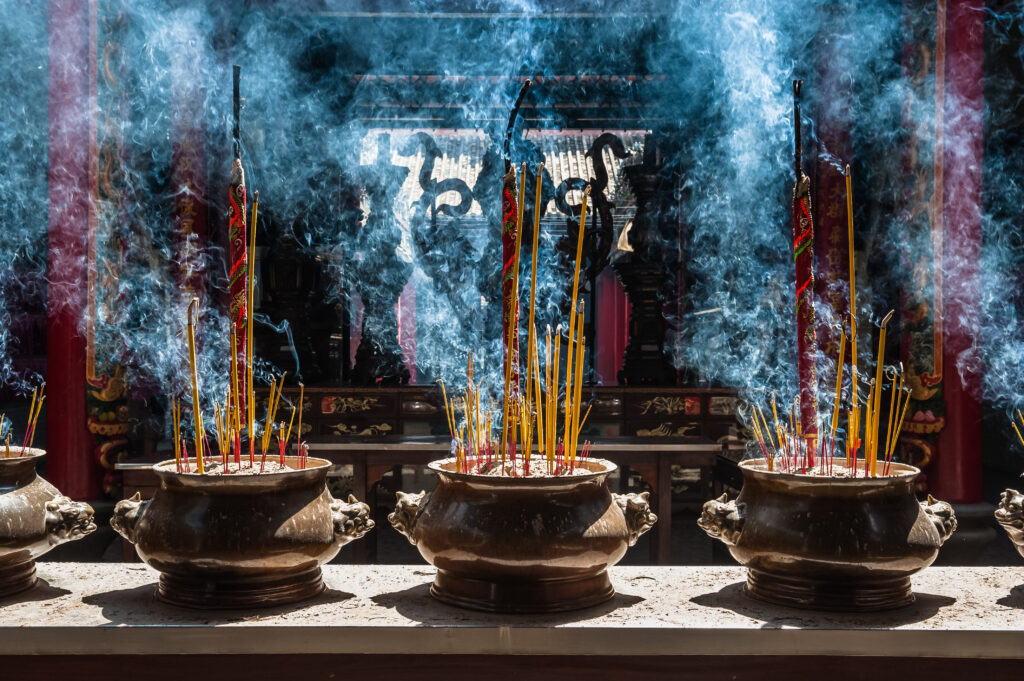
The majority of Vietnamese don’t follow an organized religion in Vietnam, but instead, they have various folk beliefs that are deeply embedded in their daily lives. Despite Vietnam being declared an atheist state by its communist government, having a religion is not illegal, and the Vietnamese people embrace a variety of rich cultural traditions intertwined with spiritual beliefs. From venerating ancestors and praying to spirits, to following Buddhism, Christianity, and Caodaism, religion in Vietnam plays a crucial role in shaping the country’s identity.
Folk Religion – religion in Vietnam
Folk religion in Vietnam is practiced by nearly 90% of the population, making it the largest religion in Vietnam. Vietnamese folk beliefs are a significant and deeply rooted aspect of the country’s culture. Characterized by a blend of indigenous beliefs, ancestor worship, and the belief in spirits, this form of spirituality defines much of Vietnamese life.
In Vietnamese folk religion, people worship various divine beings or spirits, including ancestors, guardian spirits, village deities, and nature spirits. These supernatural beings are believed to hold the power to influence daily life, either bringing blessings or misfortune. Ancestor worship is particularly prominent, as ancestors are considered guardians of the family, and honoring them is a central practice of this religion in Vietnam.
Rituals and offerings play an important role in Vietnamese folk religion. Most homes have an altar dedicated to ancestors, adorned with offerings of food, incense, and other items. These offerings are made to seek protection, guidance, and blessings from ancestors and other deities. Even outside of homes, small altars are frequently found in shops, restaurants, and public places as a means of maintaining spiritual connections.
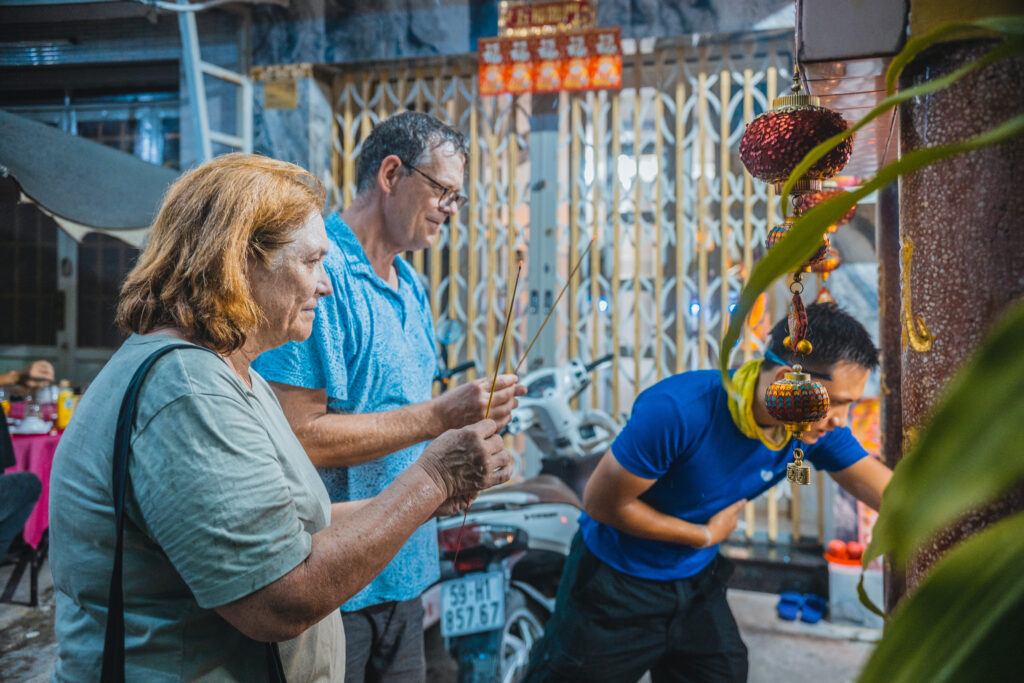
Festivals and rituals are a vibrant aspect of folk religion in Vietnam. Events such as Tet (Lunar New Year) are key moments for Vietnamese families to honor their ancestors and pray for prosperity in the coming year. While Tet is a cultural celebration, its spiritual significance is closely tied to folk beliefs. Homes are cleaned and decorated, meals are prepared for the ancestors, and temples are visited to offer prayers for good fortune.
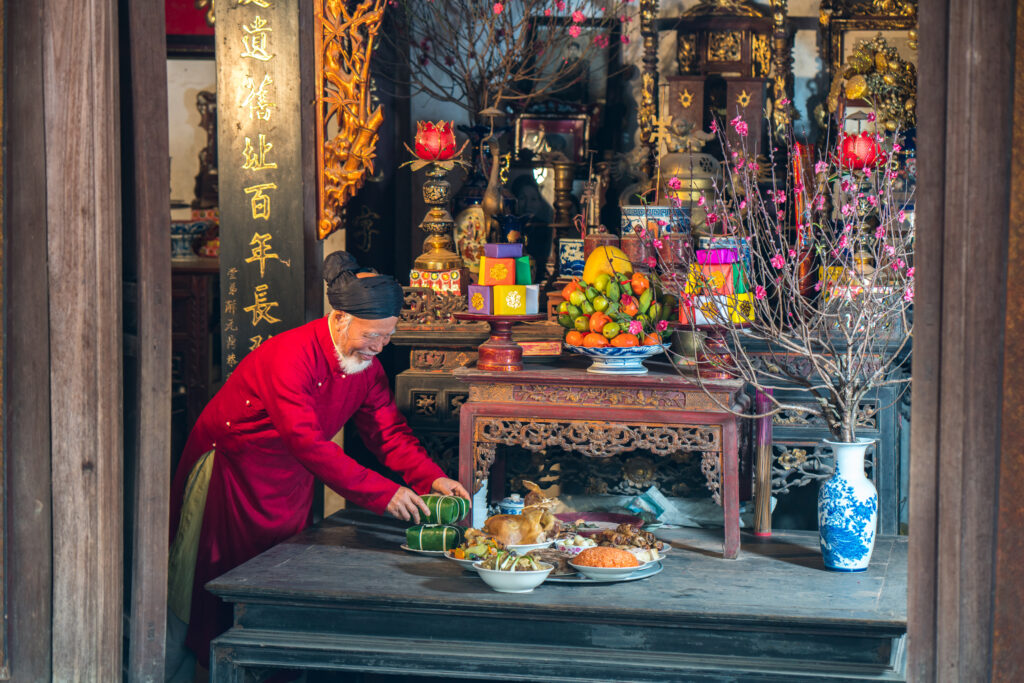
In essence, folk religion in Vietnam reflects the country’s deep spiritual connection to its ancestors, nature, and the unseen world. It is an integral part of Vietnamese culture, preserving a blend of traditions and customs that have lasted for centuries.
Buddhism – religion in Vietnam
Though folk religion is the most widespread form of spirituality, Buddhism is also deeply embedded in Vietnamese culture. Buddhism in Vietnam, practiced by about 10% of the population, has two primary branches: Mahayana Buddhism, predominantly in the north, and Theravada Buddhism, mostly in the southern regions. Temples and pagodas dot the landscape, offering serene spaces for both spiritual reflection and communal gatherings.
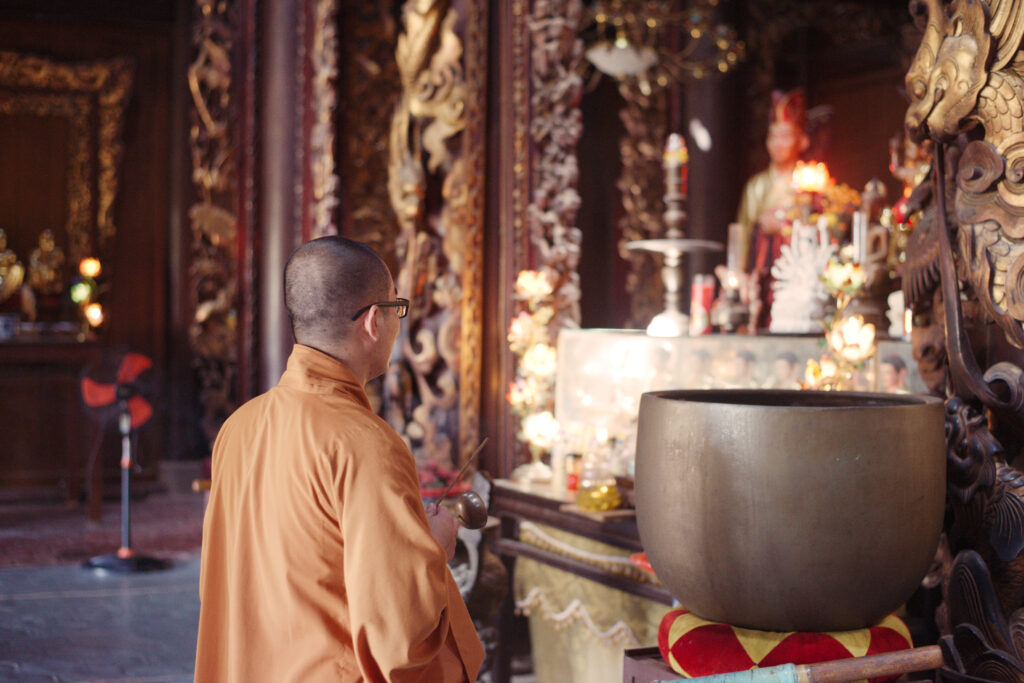
Buddhism in Vietnam is often intertwined with folk religion, as many Vietnamese practice both, seeking guidance from Buddhist principles as well as from their ancestors and local spirits. Monks in Vietnam hold a respected place in the community, offering wisdom and performing ceremonies during important life events such as births, marriages, and funerals.
Temples such as the Jade Emperor Pagoda and Ba Thien Hau Pagoda are prominent sites in cities like Ho Chi Minh City, where people visit to pray for health, prosperity, and protection from spirits. These temples are not only important religious spaces but also cultural landmarks, attracting both worshippers and visitors interested in understanding religion in Vietnam.
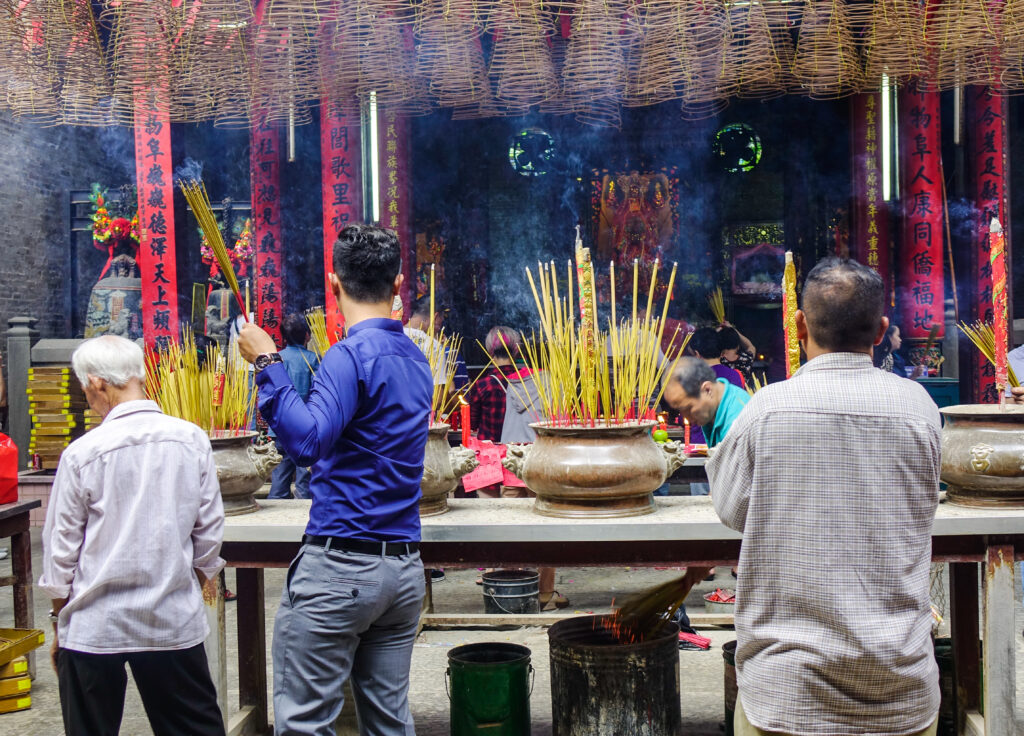
To explore more of these spiritual landmarks, you can visit some of the most famous sites in the country. Check out our blog on a guide to visit Phu Chau floating temple, or learn more about the top 9 temples in District 1.
Christianity – religion in Vietnam
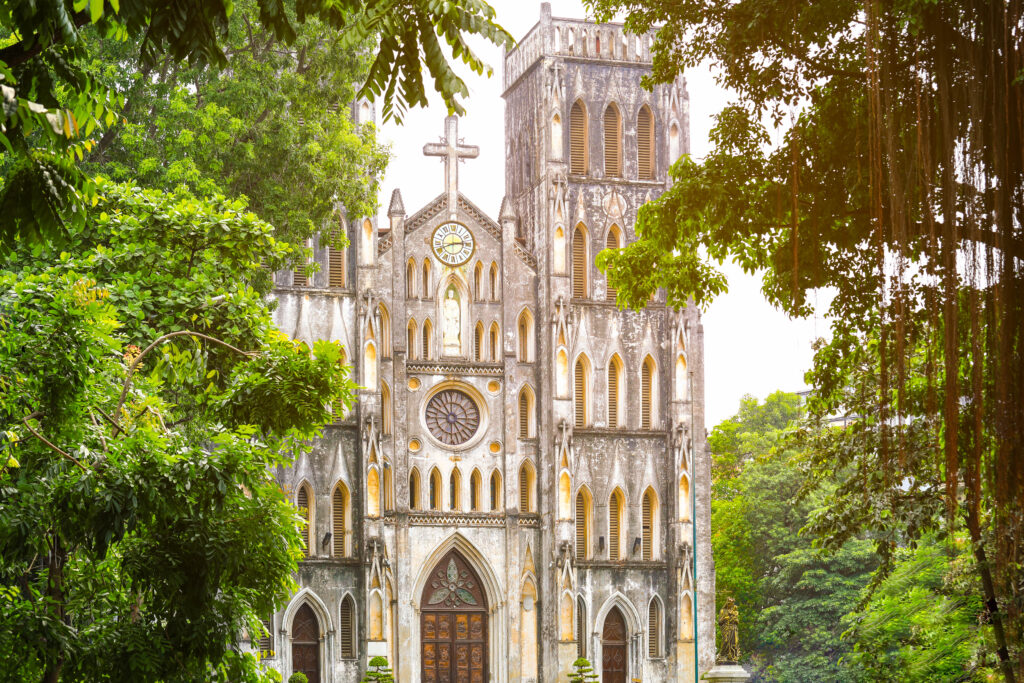
Christianity in Vietnam is another notable religion, with around 8% of the population identifying as Christian. The majority of Vietnamese Christians are Catholic, while a smaller number follow Protestantism. The arrival of Catholicism in Vietnam dates back to the 16th century, brought by European missionaries, while Protestantism emerged during the colonial period.
While Christianity remains a minority religion in Vietnam, its influence is evident in the many beautiful churches scattered throughout the country. Cha Tam Church in Ho Chi Minh City, for example, stands as an important symbol of Vietnam’s Catholic community, while also serving as a historical site with deep roots in the local culture.
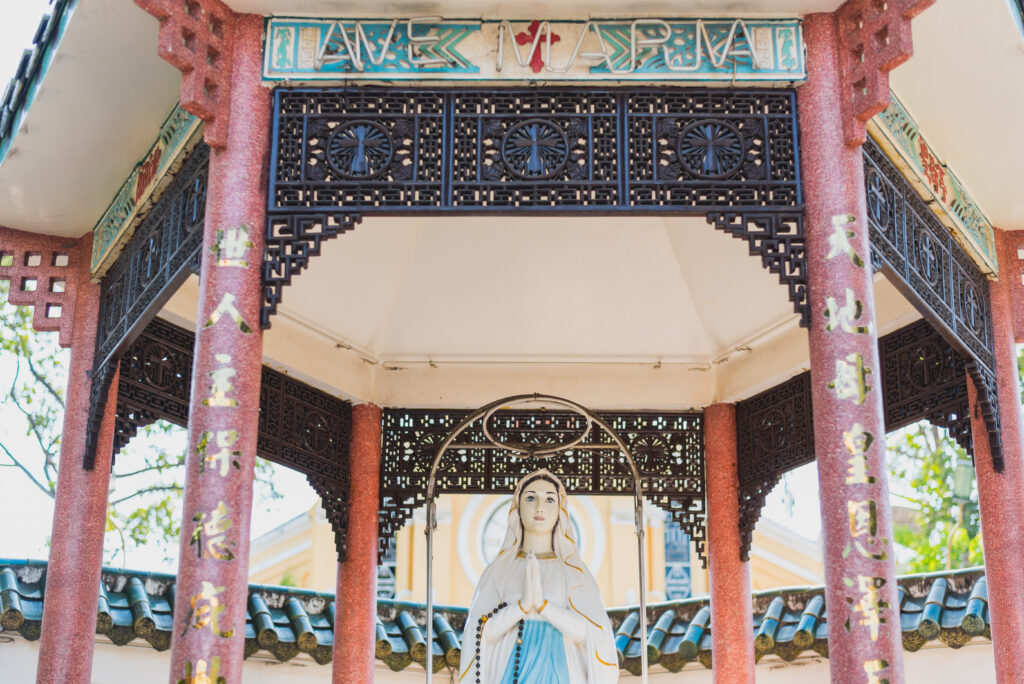
In rural areas, particularly in the central highlands, many ethnic minority groups have embraced Christianity, blending it with their traditional customs. Church services, sacraments, and religious festivals are an important part of the Christian practice in these communities, creating a blend of local and imported spiritual traditions.
Caodaism – religion in Vietnam
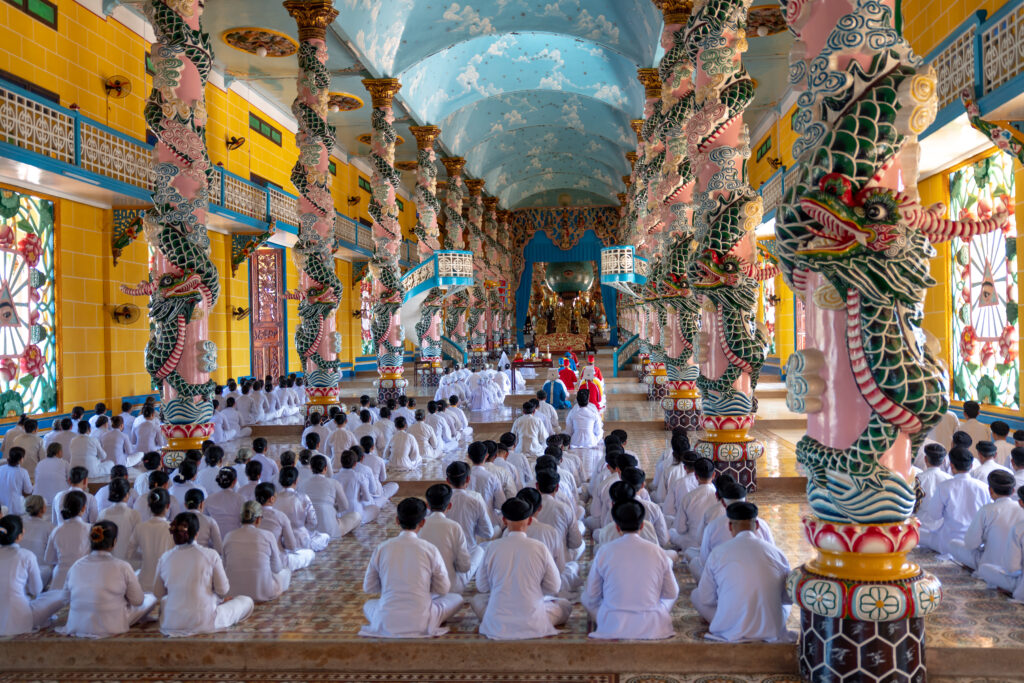
One of the most fascinating aspects of religion in Vietnam is the rise of Caodaism, a syncretic religion that originated in the country in the 1920s. Caodaism combines elements of Buddhism, Confucianism, Taoism, Christianity, and local folk beliefs, forming a unique spiritual practice that seeks to unify all religions.
Caodaists worship a supreme deity known as Cao Dai and believe in the guidance of spiritual masters from various religious traditions. The most famous site of Caodaism is the Tay Ninh Holy See, located near Ho Chi Minh City, a grand temple known for its vibrant and colorful architecture. The ceremonies held at the Holy See are an extraordinary blend of different religious customs, making it a must-see for those interested in religion in Vietnam.
Hoahaoism – religion in Vietnam

Hoahaoism, founded in 1939 by Huynh Phu So, is a syncretic religion that blends elements of Buddhism, Confucianism, and folk beliefs. Originating in the Mekong Delta, it emphasizes simplicity, morality, and community service. Unlike traditional Buddhism, Hoahaoism encourages at-home worship with minimal rituals, making spiritual practice accessible to all, especially rural communities. Followers believe in karma and reincarnation and focus on charitable acts to help the less fortunate. The religion, though modest in its practices, plays an important role in southern Vietnam’s spiritual and social landscape.
Islam – religion in Vietnam
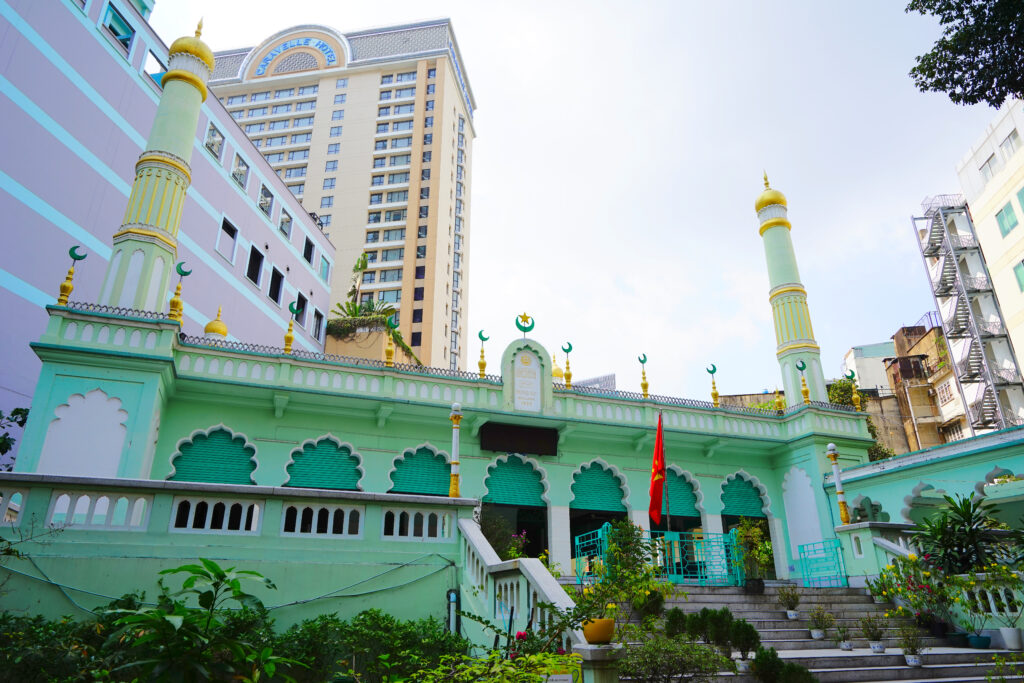
Though Islam represents a minority religion in Vietnam, it holds cultural significance, particularly among the Cham ethnic group in southern regions like An Giang, Ninh Thuan, and Ho Chi Minh City. Introduced through Malay and South Asian traders in the 10th century, Islam became intertwined with Cham customs, creating a unique form of Islamic practice.
The Cham Muslim community, known as Bani Muslims, follow traditional Islamic practices such as daily prayers, fasting during Ramadan, and observing major religious holidays like Eid al-Fitr and Eid al-Adha. Prominent mosques, like the Jamiul Muslimin Mosque and Musulman Mosque in Ho Chi Minh City, serve as spiritual and communal hubs for both locals and expatriates.
In addition to the Cham Muslims, Sunni Muslims, including foreign nationals and Vietnamese converts, add to the diversity of Islam in Vietnam. Halal cuisine plays a prominent role in Cham Muslim culture, featuring dishes that adhere to Islamic dietary laws, such as goat curry and fish dishes.
Despite its small presence, Islam remains a meaningful part of Vietnam’s religious and cultural tapestry, reflecting the country’s rich diversity.
Let’s Wrap It Up
Religion in Vietnam offers a fascinating glimpse into the country’s history, traditions, and diverse belief systems. From folk religion and ancestor worship to the towering pagodas and majestic churches, Vietnam’s spiritual life is as diverse as its landscapes.
While visiting, you can explore the many spiritual and religious sites that tell the story of Vietnam’s past and present. Whether you’re delving into the local customs of Chinatown in Ho Chi Minh City or visiting its many temples and churches, you’ll find that Vietnam’s spiritual traditions are deeply connected to its culture and daily life.
And for those looking to explore even more of this vibrant city, don’t miss our recommended reads for an exciting and well-rounded experience:
- 25 Unusual Things to Do in Ho Chi Minh City
- 20 Things to Do in Ho Chi Minh City at Night
- 12 Must-Do Tours in Ho Chi Minh City
- 26 Things to Do in Chinatown Ho Chi Minh
- Top 10 Romantic Things to Do in Ho Chi Minh City
- 25 Things to Do with Kids in Ho Chi Minh City
Vietnam’s spirituality is more than just a practice; it’s an integral part of what makes this country so unique. Wherever your journey takes you, embrace the history, beliefs, and customs that shape everyday life in this remarkable land.
Ho Chi Minh City Cycling Tour In Ho Chi Minh City (Saigon) – Vietnam
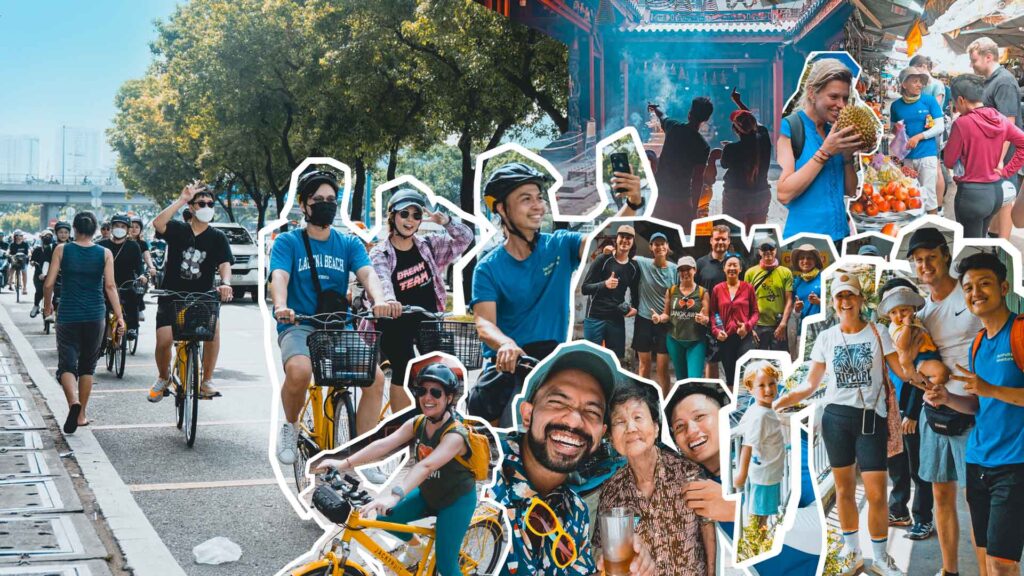
At Jackfruit Adventure, we organize Ho Chi Minh City Cycling Tour and Team Building Ho Chi Minh. With a deep knowledge of Saigon city and local connections, we believe we can give you an awesome bonding time together. Contact us today if you have any requests or questions to prepare a trip for your team to bond in Ho Chi Minh – Vietnam.




